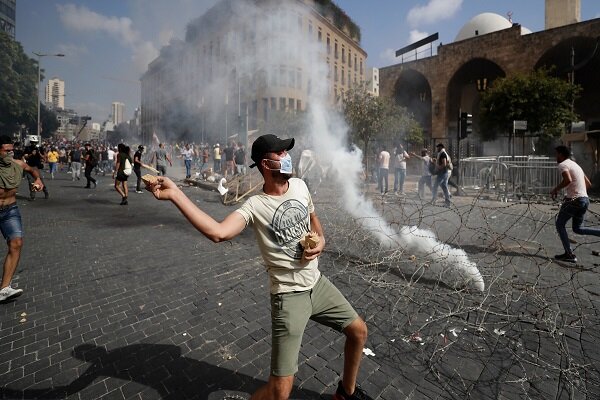While Lebanon as a crisis-ridden country needs unity more than ever these days to get out of this complex and sensitive situation, some sides make every effort to obstruct the path to tranquility in the country.
The Lebanese had not yet recovered from the shock of the devastating blast in Beirut with an unimaginable number of casualties that they suddenly noticed that many residential houses around Jabal al-Mashgara in the Bekaa Plain in southeastern Lebanon have caught fire.
Less than a day after the second incident, there were reports in the Lebanese local and foreign media outlets that some people had attacked ministries and government buildings.
Who are the beneficiaries of the street riots in Beirut?
Regardless of the purpose of the attackers on government buildings and committing sabotage acts such as burning tires and destroying ministry buildings, along with trying to destroy or steal many important corruption files, and whether they were really protesting or sabotaging, the big question that comes to mind is that who will benefit from these riotous behaviors in such a critical situation.
All around the world, the first step to manage a crisis is to return calm and stability, what some people do not let to happen in Lebanon. Dealing with the consequences of the devastating explosion that took place in the port of Beirut - which according to the latest statistics killed 158 people and left more than 6,000 injured and made hundreds of thousands homeless - regardless of whether it was due to negligence of the relevant authorities or not, entails national solidarity in order to provide assistance at least a large number of victims quickly.
Those who attacked the ministries and destroyed the government buildings on Saturday night, with the aim or under the pretext of supporting the victims of the Beirut disaster have in fact caused another problem.
Suspicious attempts to destroy corruption documents
Lebanese media reported that those who attacked the Foreign Ministry intended to destroy corruption documents. According to the Al-Mayadin network, this is the exact thing that some parties have been pursuing since 1992. So, perhaps part of the answer to the question about the causes of the Saturday night attack can be found here. The biggest beneficiaries of this event is those who are facing big corruption cases.
In this regard, Lebanese Industry Minister Emad Huballah points to infiltration of suspicious elements among the demonstrators to destroy the documents in the ministries.
He warns about some moves to prevent the completion of government investigations and announcing the results in coming days.
On the other hand, many Lebanese observers, including retired General Charles Abi Nader, believe that those who attacked government buildings and ministries are those who do not want the Beirut blast to be handled domestically and intend to internationalize it. As in the case of the assassination of Rafik Hariri, pro-U.S. and Western-backed Lebanese groups brought the case to international court with the chief aim of undermining and accusing Hezbollah.
In this context, the March 14 movement also seeks to fish in troubled waters. And while this group, along with its affiliated political currents, is expected to help facilitate international aid to Lebanon and alleviate the suffering of the Lebanese people, it is trying to block international aid delivery.
Prior to Saturday night's events, a number of the movement's affiliates called for isolation of the government at regional and international level, saying that the government should not receive even a dollar in international aid. Some of them have also taken explicit positions in opposition to Hezbollah.
Also, before the protesters attacked the government buildings, some reports cited by the Lebanese newspaper Al-Akhbar, indicated that the groups under the supervision of Baha al-Hariri and Ashraf al-Rifi had been getting ready to come to the streets and close transport routes and increase tensions in Lebanon and the region.
The March 14’s rush to accuse the government of negligence and blame it for the Beirut tragedy indicates that the movement, along the U.S.-Persian Gulf coalition, was plotting to overthrow the new Lebanese government.
However, if the Lebanese government deserves to be blamed for the Beirut port explosion, the storage of more than 2,500 tons of ammonium nitrate in this sensitive area was done during the previous government.
However, if the Lebanese government deserves to be blamed for the Beirut port explosion, the storage of more than 2,500 tons of ammonium nitrate in this sensitive area was done during the previous government.
In the aftermath of the blast, Lebanese Prime Minister Hassan Diab, speaking under pressure from the streets of Beirut, said that holding early parliamentary elections might be a good way out of the crisis.
But many analysts believe that holding parliamentary elections is likely to lead to a repeated scenario in Lebanon, a challenge that may last for months in the country with no achievement but creating more problems for the government and the nation.
But many analysts believe that holding parliamentary elections is likely to lead to a repeated scenario in Lebanon, a challenge that may last for months in the country with no achievement but creating more problems for the government and the nation.
TAGS


No comments:
Post a Comment